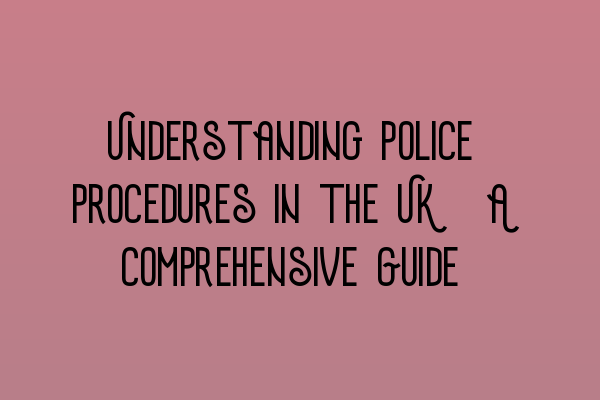Understanding Police Procedures in the UK: A Comprehensive Guide
If you find yourself involved in a criminal matter in the UK, it is essential to have a clear understanding of the police procedures that will be followed. By familiarizing yourself with these procedures, you can navigate the criminal justice system with confidence, knowing your rights and obligations at each stage. In this comprehensive guide, we will take you through the various steps of police procedures in the UK.
Arrest and Detention
When the police have reason to believe that you have committed an offense, they have the power to arrest you. The arrest must be carried out according to specific procedures to ensure that your rights are protected. Upon arrest, you will be informed of the reasons for your arrest and your right to remain silent. It is important to remember that anything you say can and will be used against you, and it is advisable to seek legal representation if you are arrested.
Interviewing and Questioning
After your arrest, the police will conduct an interview to gather evidence and determine your involvement in the alleged offense. During the interview, it is crucial to exercise your right to legal advice. You have the right to consult with a solicitor before and during the interview, who can guide you on what to say and what not to say. Your solicitor will ensure that your rights are protected and may advise you on whether to answer certain questions.
Release or Charge
Following the interview, the police will decide whether to release you without charge, caution you, or charge you with an offense. If you are released without charge, it is important to remember that the matter may not be over. The police can further investigate the case and, if new evidence emerges, they may decide to charge you later.
If you are cautioned, this means that you admit guilt and accept a formal warning. A caution will appear on your criminal record and may have consequences in the future. It is crucial to seek legal advice before accepting a caution to fully understand the implications.
If the police decide to charge you with an offense, you will be informed of the charge and provided with a court date. At this stage, it is essential to seek legal representation immediately as you will need to prepare your defense for the upcoming trial.
Bail and Remand
Depending on the severity of the alleged offense, the police may grant you bail or remand you in custody after being charged. Bail allows you to be released from custody, with or without conditions, while awaiting trial. If the police have concerns that you may flee, commit further offenses, or interfere with witnesses, they may impose conditions on your bail.
Remand, on the other hand, means that you will be held in custody until your trial. It is crucial to have legal representation throughout this period to ensure your rights are protected and to explore any possibilities for obtaining bail.
Legal Representation
Throughout the entire criminal process, it is highly recommended to obtain legal representation from a qualified solicitor. A solicitor with expertise in criminal law can provide invaluable advice, assist in building your defense, and ensure that your rights are protected at all times. They can also guide you through the complex procedures and represent you in court.
In conclusion, understanding police procedures in the UK is vital when navigating the criminal justice system. By familiarizing yourself with arrest and detention, the interviewing and questioning process, the outcomes of release or charge, bail and remand, and the importance of legal representation, you can effectively protect your rights and obtain the best possible outcome for your case.
For more information on related legal topics, please refer to our articles:
– [Essentials of Consideration: Understanding the Backbone of Contracts](https://contract-law-sqe.co.uk/essentials-of-consideration-understanding-the-backbone-of-contracts/)
– [Mistake in Contract Law: Unraveling the Impact on Agreement Validity](https://contract-law-sqe.co.uk/mistake-in-contract-law-unraveling-the-impact-on-agreement-validity/)
– [Counter-offers: The Art of Negotiating in Contract Law](https://contract-law-sqe.co.uk/counter-offers-the-art-of-negotiating-in-contract-law/)
– [SQE Workshops on Contract Law: Strengthening Your Knowledge and Skills](https://contract-law-sqe.co.uk/sqe-workshops-on-contract-law-strengthening-your-knowledge-and-skills/)
– [Recent Judgements in Contract Law: Staying Up to Date with Legal Precedents](https://contract-law-sqe.co.uk/recent-judgements-in-contract-law-staying-up-to-date-with-legal-precedents/)
We hope you found this guide helpful in understanding police procedures in the UK. Should you require any further legal assistance, please do not hesitate to contact SQE Criminal Law & Practice Law UK.
